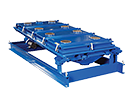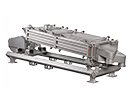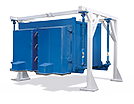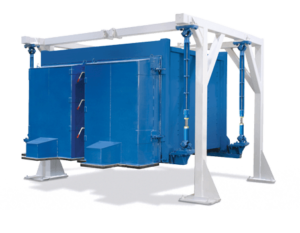Case Studies and Technical Articles
How have other companies — including Fortune 500 brands — used Rotex industrial screeners?
Rotex Helps to Reduce Greenhouse Gases in U.S. Corn Production
Rotex is passionate about our mission to Improve Lives Through Optimizing the Use of our World’s Natural Resources. Check out this article where our President, Lawrence Rentz, walks through how Rotex screening solutions make a positive impact on environment sustainability:
Click here to download this article as a PDF.

Rotex President, Lawrence Rentz, details how Rotex’s commitment to sustainability saves energy producing potash for U.S. corn farming.
I have had the pleasure of working for four great companies throughout my career as well as working with many of you who may be reading this article right now. In the end, even though I have been blessed to have so many amazing experiences, something was missing for me. I didn’t realize what that “something” was until I joined Rotex, a Hillenbrand company—a company truly committed to sustainability.
Rotex’s mission is unique and keenly focused on the betterment of our environment: Improving Lives Through Optimizing the Use of our World’s Natural Resources. The simple truth is that sustainability is part of everything that we at Rotex do and aligns our focus of having a positive impact on our world.
Rotex, a 184 year old company, produces separators whose core function is to save energy and reduce waste. With thousands of Rotex separators in operation worldwide in hundreds of different applications, Rotex impacts millions of lives each day.
Just one example of this impact is how approximately 300 Rotex separators installed globally help to process potash, a highly impactful nutrient used in efficiently growing crops, like corn, to feed our world.
Click here to download Rotex’s potash application specifications PDF.
Imagine the size of the state of Montana, the U.S.’s fourth largest state by area. That is the approximate number of acres in the United States where corn was planted in 2019 – 91 million acres.1 For each one of those acres, approximately 150 pounds of potash, produced from processes using Rotex separators, is used each year to provide nutrients to the soil.2
It takes energy to produce potash, and harmful greenhouse gases (GHGs) are an undesirable byproduct of this production. In fact, approximately 39 pounds of greenhouse gases (GHGs) per ton of potash are emitted into the atmosphere, resulting in over 93,000 tons of GHGs generated each year in support of the U.S. corn crop alone.
How does a Rotex separator help improve production efficiency and save energy?
First, the separator screens material upstream of a critical crushing process. This ensures product is captured that is already within specification prior to the step of crushing, an operation which consumes significant energy.
If good quality potash is processed through the crusher, it can become powder, bringing it out of specification and creating the need to recompact the material into a larger form – wasting even more energy. In total, Rotex separators save approximately 3% – 5% of the overall energy it takes to produce potash by avoiding the reprocessing of good material.
In this example, using the estimate of 150 pounds of potash per acre, and avoiding the need to reprocess an average of 4% waste, Rotex separators reduce GHG emissions by an estimated 3,700 tons per year.
Preventing 3,700 tons of greenhouse gas emissions from entering the atmosphere is equivalent to:
- Preventing emissions from personal vehicles driving over 11 million miles,3 or
- Preventing over 5 million pounds of coal from being burned,3 or
- Preventing close to 11,000 barrels of oil from being consumed.3
Through increased efficiency, Rotex separators also provide other key benefits to potash users, including delivering uniform particles and removing fine, dust particles during its production. Potash particles need to be a uniform size to effectively and consistently deliver nutrients across an entire corn field. In addition, many farmers utilize automated potash application systems that rely heavily upon uniform particle distribution for effective operation. Finally, Rotex screeners remove dust particles, minimizing the loss of the particles blowing in the air during transportation and application.
In short, this specific potash Rotex screening application supports critical U.S. corn production while having a profound impact on sustainability.
Click here to ask Rotex a question about fertilizer separation and production capabilities.
This is just one of the reasons I’m passionate about leading an organization like Rotex. Sustainability is at the heart of what we do, and each solution we offer is focused on reducing waste and improving the environment. It’s a great feeling to go home each evening knowing you played a small part in making our world a better place.
I’m excited to share more examples of Rotex’s ongoing sustainability efforts with you in the coming weeks.
Click here to learn more about Rotex’s fertilizer separation and production capabilities.
1 USDA Economic Research Service: https://www.ers.usda.gov/topics/crops/corn-and-other-feedgrains/feedgrains-sector-at-a-glance/
2 SFGate Corn Potash Requirements: https://homeguides.sfgate.com/corn-potash-requirements-47933.html
3 US Environmental Protection Agency, Greenhouse Gas Equivalencies Calculator: https://www.epa.gov/energy/greenhouse-gas-equivalencies-calculator





